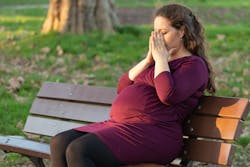Pregnant women living in blighted neighborhoods with high levels of known stressors have higher levels of testosterone – the primary sex hormone in males -- which disrupt hormone regulation and may lead to life-threatening complications during and after childbirth, according to Rutgers research.
Researchers analyzed data from 262 pregnant women who completed a questionnaire about their neighborhoods and underwent blood tests that measured sex hormones such as testosterone in each trimester.
The researchers found that women living in neighborhoods with stressors such as vacant lots, derelict buildings and other signs of disorder had significantly higher levels of testosterone – nearly 40 percent higher by the third trimester of pregnancy – than women living in well-ordered neighborhoods.
Pregnant people living in stressful neighborhoods are more likely to experience anxiety, depression and other mental health problems. These mental health problems also can hurt pregnancy outcomes.
Data for the study come from the Understanding Pregnancy Signals and Infant Development (UPSIDE) cohort, which collected biospecimens, questionnaires and medical record data from 262 women living in and around Rochester, N.Y. Researchers measured the sex hormones maternal serum total testosterone, free testosterone, estrone, estradiol and estriol in each trimester and surveyed participants about neighborhood stressors. UPSIDE is part of the NIH program Environmental Influences on Child Health Outcomes (ECHO), the largest study on child health in the U.S.
The new analysis of UPSIDE data found that 73 percent of women in the cohort reported exposure to one or more types of neighborhood disorder, while 22 percent reported any exposure to violence.
In adjusted models, neighborhood disorder was associated with higher testosterone across pregnancy, with the strongest associations observed in the third trimester, where neighborhood disorder was associated with an average testosterone elevation of 38 percent. The effect was more pronounced in women carrying male rather than female fetuses.
Exposure to violence wasn’t associated with any hormones.

